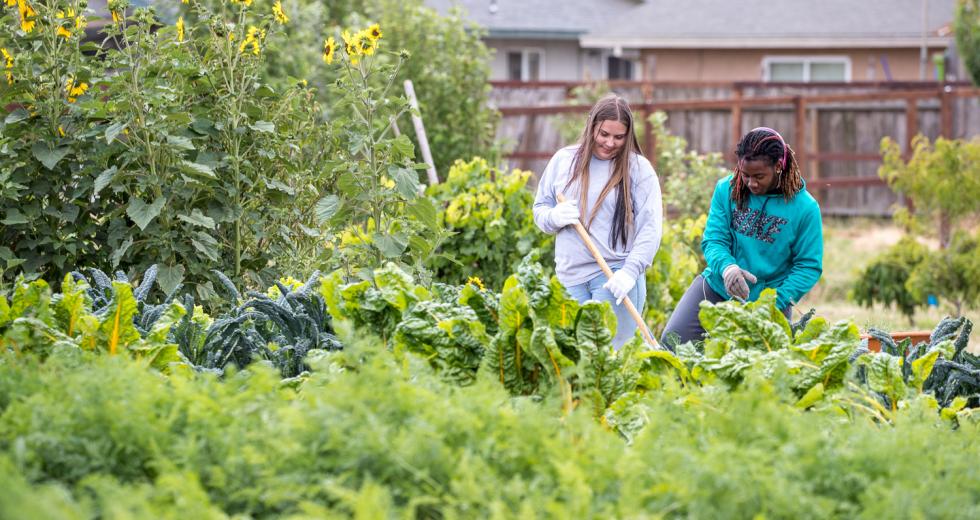During the school year, 13 students from Washington Elementary School in Stockton, meet once a week at the 5.7-acre Boggs Tract Community Farm, where the children grow seedlings into vegetables in one small patch of land. The year-long program, organized through Stockton-based PUENTES’ Children’s Urban Farm Classroom, teaches students about healthy eating habits, growing their own food and proper nutrition.
The students, in third through sixth grade, also spend time writing in their journals about their gardening tasks and other agricultural issues presented in teacher-led discussions, says Jeremy Terhune, executive director of PUENTES. “Topics include their future career plans and what it will take to attain their goals, along with record-keeping, lessons on agriculture related topics and development of social and emotional skills.”
More than 29 million people in the U.S. live in “food deserts,” where access to affordable, healthy food options is limited or nonexistent. (A food desert is defined as any urban home where a grocery store is further than one mile away, or 10 miles away in a rural area, according to the U.S. Department of Food and Agriculture.) More than 15 million children currently live in food-insecure households — with limited access to adequate food and nutrition due to cost, proximity and/or other resources, according to the USDA.
Related: Soil Born Builds A Pipeline
Related: Green Tech – Education Spurs Local Economy
Many Stockton neighborhoods qualify as food deserts. PUENTES — a nonprofit urban farm in the city — is trying to change that. Terhune founded the organization in 2009 after he returned home from Peace Corps service in Panama and realized that parts of Stockton had more food insecurity than what he’d seen in Central America.
PUENTES stands for “Promotores Unidos Para La Educación Nacional de Tecnologias Sostenibles,” which translates to Promoters United for the National Education of Sustainable Technologies.
Terhune says their Children’s Urban Farm Classroom program is meant to develop a safe learning landscape and encourage upward mobility of the typically-underserved students. The benefits are multifaceted and far-reaching, he says, and for the children include improving knowledge and vocabulary, problem solving, social skills and the awareness of available resources.
PUENTES’ approach, Terhune says, is unique because the team strives to develop educational and agricultural activities that local governments can then replicate to help their local communities. Building equity in neighborhoods plagued by inadequate access to healthy, whole foods through sustainable technology and educational opportunities is the focus at PUENTES.
Right To Your Door
PUENTES also offers community supported agriculture programs — known as CSAs — throughout the Capital Region. CSAs have become a popular way for consumers to buy local, seasonal food directly from a farmer. With a typical CSA, a farm offers a number of shares (boxes of vegetables or other produce) to the public in exchange for a subscription or membership, in which members receive weekly seasonal produce throughout the farming season. Farmers offer CSAs, in part, because it helps to provide a steady income stream as well as much-needed upfront capital at the start of the growing season.
CSAs also create opportunities for families to feed themselves more nutritiously and healthfully through the chance to participate in sustainable urban agriculture and growing natural foods to make them more widely available in the community, Terhune says.
Soil Born Farms is another local nonprofit that helps better connect urban residents to their food, their health and their environment: From their early roots located in the middle of Sacramento County, Soil Born has long-offered a variety of projects and programs in the community that help create a healthier food system both in their neighborhood and at a regional level.
Though they also do work with regional partners to address bigger food system needs, “95 percent of our work happens at the neighborhood level where we work with residents and partners to envision and create a health-promoting food system,” says Co-Director Shawn Harrison. This includes the Growing Together initiative of helping to develop sustainable school garden programs that teach children about nutrition and science, similar to the goals of the PUENTES school program.
“We transform all of our revenues into garden spaces, educational programs and workforce development opportunities for the community.” Jeremy Terhune, executive director, PUENTES
Alongside their CSA program, PUENTES focuses their efforts on the Boggs Tract Community Farm in Stockton, a garden at the San Joaquin County Fairgrounds and the Black Urban Farmer’s Association plot, located in three of the major food desert areas of San Joaquin County.
The nonprofit also runs other programs to serve their mission of empowering at-risk communities to feed their families healthy food through the knowledge and development of sustainable technology and urban farming.
“PUENTES CSA is an entirely community-based program,” Terhune says. “We harvest and sell boxes of locally-produced fresh fruits, vegetables, eggs, honey and more from our farm, and we transform all of our revenues into garden spaces, educational programs and workforce development opportunities for the community.”
Too often, he says, the commercial food economy provides “pass-through” value to the community. “We want to keep those dollars circulating in the local economy and create more food security and jobs where people need them most,” he says.
Growing and Growing
Al and Inez Aldridge, husband and wife, started out gardening on the PUENTES farm five years ago after retirement and now farm for PUENTES with the group they’ve founded, the Black Urban Farmers Association, where they serve a mission of growing and providing healthy, nutritious and affordable food to underserved communities.
“Our original farm started out as a plot here at PUENTES. We took the monthly classes and everything that we learned from PUENTES allowed us to start our own farm and to then start Black Urban Farmers Association,” Inez Aldridge says.
Related: Grow Your Own Way
BUFA comprises five black farmers, all retired from their previous careers, and is celebrating its two-year
anniversary this summer. The group holds a contract to grow produce for the PUENTES CSA, as well as other CSAs serving Oakland, Marin and Sacramento.
“The impact we’re making is educating people so they can see that food doesn’t just come from the supermarket,” Inez Aldridge says. “It comes from the soil and with everyone’s help, including the kids, we can create a sustainable community with healthy and fresh foods.”
From one of the community gardeners to now farming for PUENTES, the Aldridges have grown right alongside the organization. Terhune says it has been a great joy to observe how his organization has grown from a small community garden to the driving force behind urban agriculture in San Joaquin County.
PUENTES has joined in an innovative partnership with San Joaquin County Healthy Retail and Mandela Marketplace to become a small-scale distributer for corner stores and small restaurants that cannot afford to do business with larger distributors. Business owners will be able to visit the organization’s online platform to browse offerings and have appropriately sized orders delivered to their business every week.
Starting in June, they launched a bi-monthly farmers market with EBT purchase options at Boggs Tract Community Farm. They will also launch an Urban Forestry project in partnership with California ReLeaf, Washington Elementary School and the Port of Stockton to plant more than 200 trees to combat air quality.
“PUENTES envisions neighborhoods throughout the region — like Boggs Tract — that over time, will become more food secure, economically resilient and offer a healthier environments as a result of a thriving network of urban agriculture activities and farm businesses,” Terhune says. “We view hunger, malnutrition and environmental quality as community-based issues.”
This story is part of the 22nd annual Capital Region Cares, Comstock’s special publication dedicated to nonprofits and charitable giving. You can order the 2017-2018 edition online here. To submit your nonprofit success story for consideration in next year’s edition, fill out this online form.




